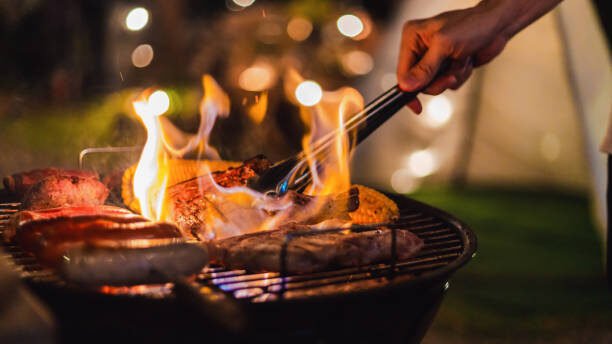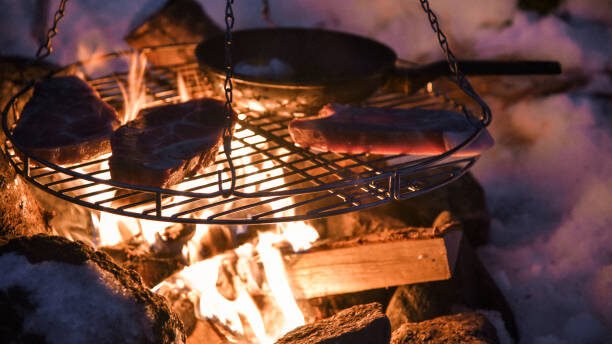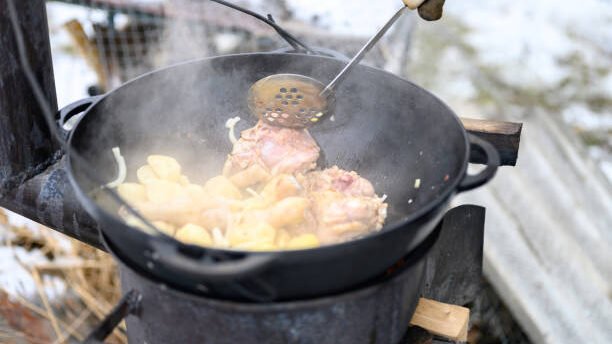Contents
Introduction to camping Winter Food
The introduction sets the stage for the topic of eating in extreme cold weather. It emphasizes the critical role of nutrition in maintaining health and energy levels when temperatures are exceptionally low. As the temperature drops, the body needs more energy to produce heat and keep warm. By highlighting the increased calorie requirements in cold weather, the introduction underscores the significance of consuming the right foods to sustain energy levels and overall well-being. Additionally, it outlines the purpose of the guide, which is to explore the best foods and offer nutrition tips to help individuals thrive in freezing temperatures. This introduction aims to capture the reader’s interest and provide a clear direction for the rest of the blog post.

1- Importance of Nutrition in Cold Environments
In cold environments, the body faces increased demands to maintain its core temperature and fend off the chilling effects of the weather. This heightened need for warmth means that the body naturally burns more energy to stay warm, leading to greater calorie expenditure. Adequate nutrition becomes indispensable in such circumstances, as it provides the necessary fuel to meet these elevated energy demands. Proper nutrition not only ensures that the body has the energy it needs to generate heat but also plays a vital role in supporting overall health and well-being. Essential nutrients obtained from a balanced diet help to regulate body temperature, strengthen the immune system, and facilitate the efficient functioning of bodily processes. In cold climates, where the risk of exposure to harsh elements and potential illness is heightened, maintaining a well-nourished body becomes even more crucial for survival.
Furthermore, nutrition is essential for sustaining the energy levels required for engaging in outdoor activities in freezing temperatures. Whether it’s shoveling snow, skiing, or simply navigating icy pathways, the body relies on a steady supply of nutrients to power through these tasks and maintain optimal performance. Overall, proper nutrition in cold environments is not just about satisfying hunger—it’s about providing the body with the essential nutrients it needs to withstand the challenges posed by extreme weather conditions and maintain its health and resilience.

2- Top Foods to Eat in Extreme Cold Weather
In extreme cold weather, it’s essential to consume foods that provide your body with the necessary energy to generate heat and maintain warmth. Here are some recommendations on what to eat in extreme cold weather:
-
- High-Calorie Foods: Opt for foods that are rich in calories to fuel your body’s internal furnace. Foods like nuts, seeds, dried fruits, and trail mix are excellent choices as they provide a concentrated source of energy.
-
- Complex Carbohydrates: Foods high in complex carbohydrates, such as whole grains, potatoes, and legumes, can help keep you warm by providing a steady release of energy. Consider incorporating hearty dishes like soups, stews, and casseroles into your meals.
-
- Protein-Rich Foods: Protein is essential for maintaining muscle mass and keeping your body warm. Include sources of protein such as lean meats, poultry, fish, eggs, tofu, and beans in your diet.
-
- Fatty Foods: Foods rich in healthy fats can provide insulation and help keep you warm in cold weather. Incorporate sources of healthy fats such as avocados, olive oil, nuts, seeds, and fatty fish like salmon and mackerel into your meals.
-
- Warm Beverages: Sipping on hot beverages like tea, coffee, hot chocolate, or broth can help raise your body temperature and provide comfort in cold weather. Consider carrying a thermos with hot drinks when venturing outdoors.
-
- Spicy Foods: Spices like chili peppers, ginger, garlic, and cinnamon can help increase circulation and boost metabolism, thereby promoting warmth from within. Add spices to your meals or enjoy spicy dishes like curry or chili to stay cozy in the cold.
-
- Hydration: While it may seem counterintuitive, staying hydrated is crucial even in cold weather. Drink plenty of fluids, including water, herbal teas, and fruit-infused water, to prevent dehydration, which can impair your body’s ability to regulate temperature.
-
- Portable Snacks: Pack portable snacks like energy bars, granola bars, cheese, crackers, and dried fruit to provide quick energy and sustenance while on the go.

By incorporating these foods into your diet, you can nourish your body and stay warm and energized even in the most frigid conditions. Stay mindful of your nutritional needs and prioritize foods that provide warmth, energy, and comfort during extreme cold weather.
Also Read: Essential Winter Survival Tips
3- Hydration Strategies in Cold Climates
In cold climates, staying hydrated remains a critical aspect of maintaining overall health and well-being, despite the lower perception of thirst compared to warmer environments. Even though you might not feel as thirsty in the cold, your body continues to lose moisture through respiration and perspiration. This loss of fluids can lead to dehydration if not adequately replenished. To combat dehydration and ensure optimal bodily functions, it’s essential to prioritize hydration even in cold weather conditions. In addition to water, which is always a fundamental choice for hydration, incorporating other beverages can be beneficial.
Herbal teas, for example, not only provide hydration but also offer additional health benefits such as antioxidant properties and soothing effects. Varieties like chamomile, peppermint, or ginger tea can be particularly comforting in cold weather while contributing to hydration. Warm beverages, such as broth-based soups or hot cocoa, not only help maintain hydration but also provide a comforting warmth that can be particularly welcome in chilly climates. These beverages not only contribute to fluid intake but also offer additional nutrients and energy.

4- Tips for Preparing Cold Weather Meals
Preparing meals in extreme cold weather requires careful planning and consideration to ensure that you stay nourished, warm, and hydrated. Here are some practical tips to help you navigate meal preparation in freezing temperatures:
-
- Plan Ahead: Anticipate potential challenges and stock up on non-perishable foods that can be easily prepared in case of emergencies. Items like canned goods, dried fruits, nuts, and granola bars are excellent choices to have on hand for quick and convenient meals during severe weather conditions.
-
- Focus on Warmth: When planning meals, prioritize warm and hearty dishes that provide comfort and sustenance. Opt for soups, stews, casseroles, and hot pot meals that can help raise body temperature and keep you feeling cozy and satisfied. Incorporating warming spices like cinnamon, ginger, and cayenne pepper can also enhance the comforting qualities of your meals.
-
- Include Variety: Ensure that your meals are well-balanced by incorporating a mix of carbohydrates, protein, and healthy fats. Include plenty of fruits, vegetables, whole grains, lean proteins, and sources of healthy fats such as nuts, seeds, and avocados. This variety not only provides essential nutrients but also adds flavor and texture to your meals.
-
- Stay Hydrated: Despite the cold weather, it’s crucial to maintain adequate hydration to support optimal bodily functions. Drink fluids regularly throughout the day, including water, herbal teas, and warm beverages like broth or hot cocoa. Aim to consume at least eight glasses of water per day and adjust your fluid intake based on your activity level and the severity of the weather conditions.

Conclusion
In conclusion, prioritizing proper nutrition in extreme cold weather is paramount for sustaining energy levels, bolstering immune function, and effectively combating the cold. By adhering to a diet rich in essential nutrients, staying adequately hydrated, and implementing practical meal preparation strategies, individuals can not only endure but thrive in the harshest of climates. Throughout this guide, we’ve emphasized the significance of consuming nutrient-dense foods that provide the necessary fuel to withstand the heightened energy demands imposed by cold weather conditions. Additionally, we’ve highlighted the importance of staying hydrated, as dehydration can exacerbate the challenges posed by extreme cold temperatures.
By following the outlined tips for meal preparation and planning, individuals can ensure that their nutritional needs are met, thereby enhancing their overall health and well-being during the coldest of climates. Ultimately, staying nourished in extreme cold weather is not merely about survival; it’s about thriving and maintaining optimal health and vitality despite the challenging conditions.


